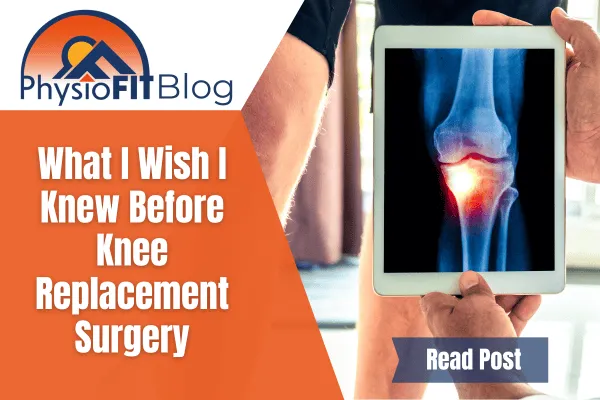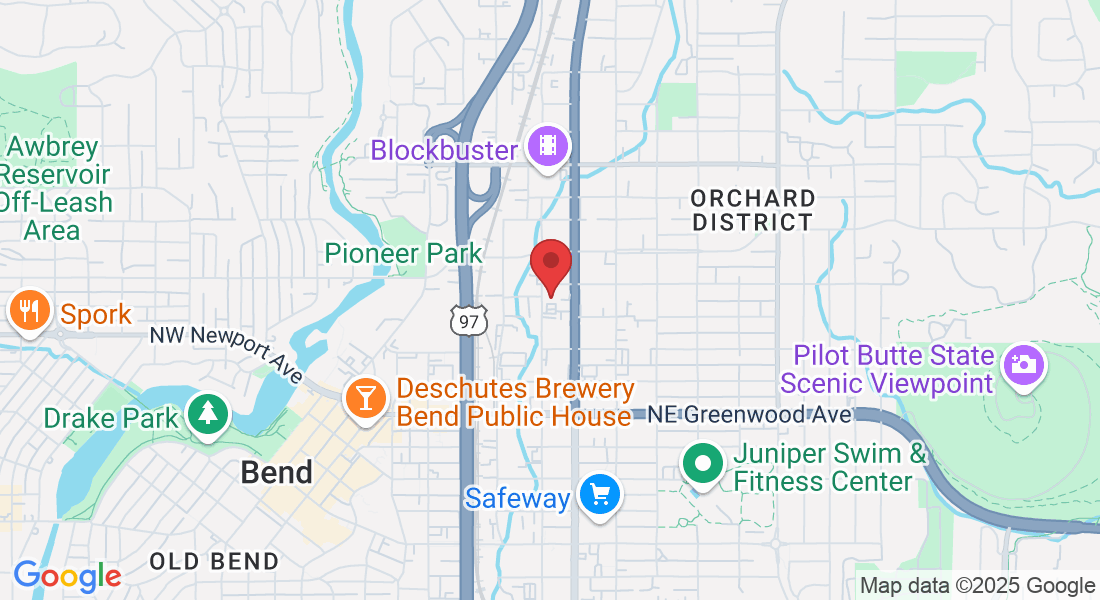Your Source for All Things Physical Therapy in Bend Oregon
The PhysioBLOG
Here, we share informative articles and insights that aim to help you achieve your full potential through our fitness-focused approach to rehabilitation. Our team is dedicated to providing you with valuable tips and techniques that can help you overcome any obstacle, whether you're recovering from an injury, surgery, or striving to build strength and wellness for life.
Stay up-to-date with our latest posts & empower yourself with elegantly simple techniques for optimal health & wellness.

What I Wish I Knew Before Knee Replacement Surgery
Please Note: The information provided on our website is intended for general education and is not a substitute for professional medical advice. Each individual's situation and body are different. Therefore, what may work for one person may not work for another. We care about your well-being and advise you to reach out to us to discuss your specific needs before implementing any advice from our website. If you’d like to explore this more or would like to schedule a time with a physical therapist in Bend Oregon, contact us at PhysioFITBend.com
Key Takeaways:
Setting realistic expectations is crucial before knee replacement surgery. Understanding the recovery process and the time it takes to regain full functionality can help manage expectations and reduce disappointment.
Managing post-surgery pain is an essential aspect of recovery. Working closely with healthcare professionals to develop a personalized pain management plan can help minimize discomfort and improve overall well-being.
It is important to be aware of the potential side effects of pain medication. Staying informed about the risks and discussing alternative options with the healthcare team can help mitigate any adverse effects.
Addressing the psychological impact of knee replacement surgery is essential. The emotional and mental challenges that come with the procedure should be acknowledged and addressed through support groups, therapy, or other appropriate means.
Rehabilitation after knee replacement surgery can be intense. Understanding the importance of following a structured rehabilitation plan and committing to regular exercises and physical therapy can optimize recovery and improve outcomes.
Having a strong support system is crucial during the recovery process. Seeking the help of family, friends, or support groups can provide the necessary emotional and physical assistance needed during the challenging times.
Exploring alternative options should be considered before knee replacement surgery. Non-surgical treatments such as physical therapy, medication, or lifestyle changes may offer significant improvements in knee function and minimize the need for surgery.
Introduction
Before undergoing knee replacement surgery, it is important to have a clear understanding of what to expect. This section aims to provide an informative and formal introduction to the topic.
By exploring the experiences and insights of individuals who have undergone this procedure, we can gain valuable knowledge. By delving into their stories and perspectives, we can better equip ourselves for the journey ahead.
It is essential to grasp the unique details surrounding knee replacement surgery, ensuring a smoother and more informed experience.
One such historical account that sheds light on this topic involves a patient who, after extensive research, discovered the importance of pre-operative exercises in optimizing their recovery process.
The Importance of Setting Realistic Expectations
Setting realistic expectations is crucial when preparing for knee replacement surgery. Having a clear understanding of what to expect can help patients mentally and emotionally prepare for the recovery process. It is important to avoid overly optimistic or pessimistic expectations, as this can lead to dissatisfaction or unrealistic goals. Understanding the limitations and potential outcomes of the surgery can help patients make informed decisions and navigate the challenges that may arise during their recovery journey. It is essential to consult with healthcare professionals who can provide accurate information and guide patients in setting realistic expectations tailored to their unique circumstances.
Managing Post-Surgery Pain
Managing Post-Surgery Pain is a crucial aspect of the recovery process after knee replacement surgery. It is important to effectively manage pain in order to ensure a smooth recuperation. Here is a 4-Step Guide to help you in managing post-surgery pain:
Medication: Follow your doctor's prescribed pain management medication regimen. Take the prescribed pain medication as directed and at the recommended intervals. This will help alleviate discomfort and manage pain effectively.
Ice and Compression: Apply ice packs to the surgical area to reduce swelling and inflammation. Use compression bandages or wraps as recommended by your healthcare provider. These methods can help alleviate pain and promote healing.
Physical Therapy: Engage in physical therapy sessions as advised by your healthcare provider. Physical therapy exercises can aid in strengthening the knee, improving mobility, and reducing pain. Follow the recommended exercise routine diligently to achieve the best results.
Rest and Elevation: Make sure to get plenty of rest and elevate your leg to minimize pain and swelling. Avoid putting excessive weight on the operated knee and use crutches or a walker as needed. Proper rest and elevation will aid in the healing process and help manage post-surgery pain effectively.
In addition to these steps, it is crucial to communicate openly with your healthcare provider about any persistent or worsening pain. They can provide further guidance and adjust your pain management plan accordingly, ensuring optimal recovery.
It is essential to follow these steps consistently in order to manage post-surgery pain effectively and maximize your chances of a successful recovery. Your commitment to pain management will contribute to a smoother rehabilitation process and ultimately help you regain your quality of life sooner.
Addressing the Psychological Impact
Addressing the Psychological Impact of Knee Replacement Surgery
Knee replacement surgery not only has physical effects but also carries a significant psychological impact. Patients often undergo a range of emotions such as anxiety, fear, and depression before and after the procedure.
Understanding and addressing the psychological impact of knee replacement surgery is crucial for the overall well-being of patients. By providing adequate support and counseling, healthcare professionals can help alleviate the emotional burden associated with this procedure. Encouraging open communication and empathizing with patients' concerns can go a long way in addressing their psychological needs.
It is important to acknowledge the unique experiences and emotions of each patient, as their psychological response to knee replacement surgery may vary. Some individuals may experience feelings of loss or fear of failure in resuming daily activities, while others may struggle with adjusting to changes in their body and lifestyle. By offering personalized care and tailored interventions, healthcare providers can help patients regain confidence and improve their mental well-being.
In addition to professional support, connecting patients with support groups or online communities can also help them cope with the psychological impact of knee replacement surgery. Peer support can provide a sense of belonging and validation, as individuals going through similar experiences can offer insights and advice based on their own journeys.
To ensure a successful recovery, addressing the psychological impact of knee replacement surgery is just as important as addressing the physical aspects. By prioritizing patients' emotional well-being and providing comprehensive care, healthcare professionals can contribute to a positive and holistic outcome for individuals undergoing this procedure. Don't miss out on the support and guidance available; reach out for assistance and take steps towards a healthier mindset. Remember, you're not alone in this journey.
The Intensity of Rehabilitation
The intensity of rehabilitation plays a crucial role in achieving a successful recovery after knee replacement surgery. Tailoring the rehabilitation program to the individual's needs and capabilities is essential for optimal outcomes. By gradually increasing the intensity of exercises and therapies, patients can regain strength, flexibility, and mobility.
Maintaining a consistent and challenging level of intensity in the rehabilitation process is important for stimulating muscle growth and promoting joint function. This can be achieved through a combination of exercises, such as range of motion movements, strength training, and cardiovascular activities. Physical therapists and healthcare professionals closely monitor the intensity of the rehabilitation program to ensure the patient's safety and progress.
It’s important to note that overexertion should be avoided to prevent setbacks or injuries. Therefore, finding the right balance between challenging exercises and proper rest is crucial. Regular assessments and adjustments of the intensity level based on the individual's progress and response to the rehabilitation program are necessary for optimal results.
The Need for Support
The Importance of Seeking Assistance Before Knee Replacement Surgery
As you prepare for knee replacement surgery, it’s crucial to recognize the significance of seeking support before undergoing the procedure. Whether it is from your healthcare provider, friends, or family, having a support system in place can greatly contribute to a smoother recovery process.
Receiving assistance from healthcare professionals, such as physical therapists and occupational therapists, can help you better understand what to expect during and after the surgery. They can provide guidance on exercises, pain management strategies, and assistive devices that can aid in your rehabilitation.
Moreover, the emotional and mental support from your loved ones can be invaluable during this challenging time. They can offer encouragement and help with everyday tasks, ensuring that you have the necessary support system to rely on as you navigate the recovery phase.
Additionally, connecting with others who have undergone knee replacement surgery can provide a unique perspective and a sense of camaraderie. Online forums or support groups can serve as beneficial platforms for sharing experiences and learning from others who have faced similar challenges.
Overall, recognizing the need for support before knee replacement surgery can make a significant difference in your overall well-being and recovery. By seeking assistance from healthcare professionals, relying on your loved ones, and connecting with others who have gone through a similar experience, you can cultivate a strong support system that will help you navigate the journey to regaining mobility and improving your quality of life.
Exploring Alternative Options
To explore alternative options for knee replacement surgery, it is essential to consider different approaches that can alleviate knee pain and improve mobility without resorting to surgery. Evaluating non-invasive treatments, such as physical therapy, medication, and injections, can be beneficial in managing knee discomfort and postponing the need for surgery.
In order to provide a comprehensive understanding of the alternatives to knee replacement surgery, the following table presents various options and their effectiveness:
Treatment Success Rate Cost Recovery Time
Physical Therapy 70% $$ 4-6 weeks
Medication 50% $$$ N/A
Injections 60% $$ 6-8 weeks
From the table, it is evident that physical therapy has a higher success rate compared to medication and injections. However, it is important to note that the recovery time for injections may be longer, and the cost of medication may be higher. Exploring these different aspects can help patients make an informed decision about the most suitable alternative option for their specific condition.
PhysioTIP: Consult with a healthcare professional to discuss the potential benefits and risks of alternative treatment options before considering knee replacement surgery.
Conclusion
It’s evident that there are several key takeaways from thisi article. Firstly, it is crucial to have a thorough understanding of the entire process of knee replacement surgery, including the potential risks and benefits. This knowledge will allow individuals to make informed decisions regarding their treatment options. Additionally, preparing both mentally and physically for the surgery is vital to ensure a smoother recovery and better outcomes. Furthermore, it is important to have realistic expectations regarding the recovery process. While knee replacement surgery can significantly improve mobility and reduce pain, it is not a quick fix.
Rehabilitation exercises and physical therapy play a crucial role in maximizing the effectiveness of the surgery. Moreover, the article emphasizes the significance of setting realistic goals during the recovery process. It is crucial to pace yourself and gradually increase activity levels under the guidance of healthcare professionals. Overexertion or pushing too hard can lead to setbacks or complications.
Additionally, the article highlights the importance of having a strong support system during the recovery period. Friends, family, or support groups can provide emotional support and assistance with daily activities, which can greatly contribute to a positive recovery experience.
If you or someone you know might be in need of knee replacement surgery, schedule an appointment with us here at PhysioFIT today for an evaluation. We can help determine the path best suited for your situation and guide you towards the best results possible.
FAQ
What is the recovery period like after knee surgery?
The recovery time after knee surgery can vary depending on the type of surgery and individual factors. However, it is important to note that recovery is often slow and may take longer than expected. It is advisable to have realistic expectations and goals by discussing them with your healthcare team before the surgery.
How can I manage the pain after knee surgery?
Knee surgery can be a major trauma to the knee region and may result in intense pain during the recovery phase. Your healthcare team will provide you with guidance on pain management techniques. Some strategies include keeping your knee elevated, applying ice regularly, and taking pain medication as prescribed. It is crucial not to overdo it and to follow the advice of your medical professionals.
Are there any side effects of pain medication after knee surgery?
Pain medication, particularly oral opioid pain relievers, may be prescribed in the early days after knee surgery to manage severe pain. However, it is important to note that opioids can have side effects such as constipation, drowsiness, nausea, vomiting, and slowed breathing. If you experience any adverse reactions while taking pain relievers, it is crucial to inform your medical team immediately so that alternative options can be explored.
What is the mental impact of knee surgery?
Knee surgery can have a psychological impact as it limits mobility and may lead to feelings of isolation, moodiness, or loneliness. It is important to remember that these negative emotions are temporary and that the recovery process takes time. If you find yourself overwhelmed by negative feelings, it is recommended to speak to your general practitioner or healthcare provider for support and guidance.
How intensive is the rehabilitation process after knee surgery?
Rehabilitation after knee surgery can be intense, especially in the initial stages. Following a physiotherapy program and committing to daily exercises as instructed by a physiotherapist are crucial for successful recovery. The duration of rehabilitation can vary depending on factors such as the type of knee surgery, age, general health, weight, and goals. It is not uncommon for physiotherapy to continue for up to 12 months after surgery.
Do I need support during the recovery period after knee surgery?
It’s important to acknowledge that you may require support during the recovery period after knee surgery. Basic everyday tasks that involve bending the knee, such as getting in and out of a chair or using the toilet, may be challenging initially. Additionally, driving is usually restricted for a while. It is important to put aside any pride and ensure you have help available to assist you until you regain full mobility.
Please Note: It's important to note that any exercises or techniques that are shared should be performed under the guidance of a qualified bend physical therapy expert to ensure correct technique and to prevent injuries. A physical therapist can provide a customized exercise program based on the individual's fitness level, goals, and any existing injuries or conditions. If you’d like to explore this more or would like to schedule a time with a physical therapist in Bend Oregon, contact us atPhysioFITBend.com
Ask The Experts

PT, MSPT, OCS, CF-L1

PT, DPT, TPI, CF-L1

PT, DPT
Copyright PhysioFIT 2025 . All Rights Reserved


